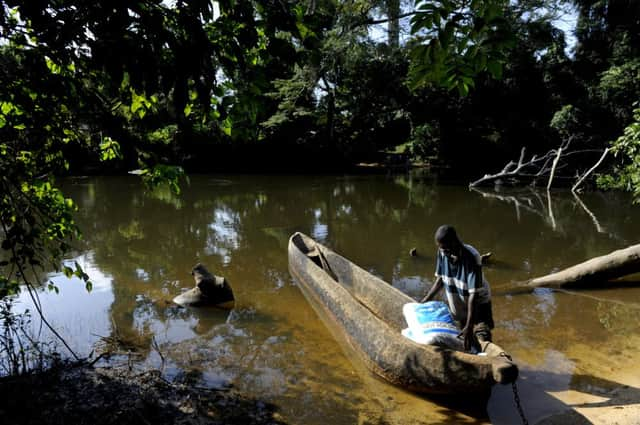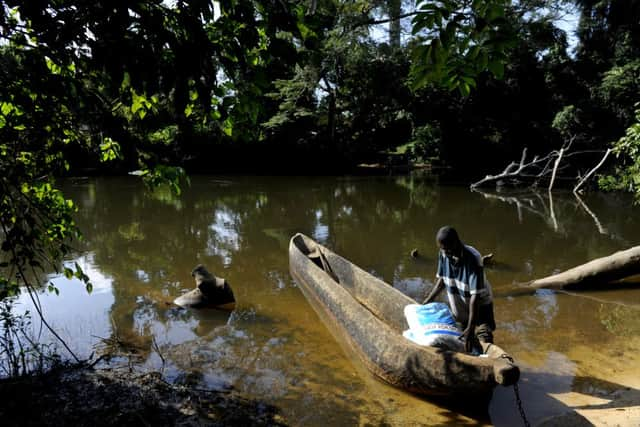Video: Mary’s Meals at work


He’s working, like the 60 per cent of the children that are not attending school in this country, according to UNESCO. Even President Ellen Johnson Sirleaf recently branded her country’s education system “a mess” and vowed reforms after all 25,000 high school students sitting state university entrance exams in August failed.
During the country’s devastating civil war that raged between 1989 and 2003 and killed over a quarter of a million people, the education system ground to a halt and ten years on, it is still struggling to rebuild. One way of getting children into education, and dealing with poverty and hunger at the same time, is by feeding children in schools. Scottish-based charity Mary’s Meals is doing exactly this, delivering school dinners to 113,500 children in Liberia every day, and to 822,142 children in 16 countries worldwide. This year’s Scotsman and Scotland on Sunday Christmas appeal is in support of Mary’s Meals.
Advertisement
Hide AdAdvertisement
Hide AdAbove that little boy’s head as he pads along the hard shoulder is another telling image of what it means to be a child in Liberia today. A little girl is pictured with the accompanying slogan, “Don’t do your man and woman business with me. I am a child.” It’s an indication of how prevalent child abuse is here. The war might have ended ten years ago, but a whole generation was brutalised, with children being abducted from the bush and forced into the rebel armies who were responsible for atrocities designed to terrorise the population. During the war 75 per cent of women were raped, according to a United Nations survey, and it is still the most reported crime, with the majority of victims aged between 10 and 19. A whole generation of Liberians was left with a legacy of trauma and only now are these scars beginning to heal.


“Schools are safe environments compared to what the child might otherwise have to deal with,” says Mary’s Meals Country Director Chris MacLullich. “Child labour is rife, as is gender-based violence and child abuse is common. It’s much safer to be in school than out in the bush where children could be raped or forced to work,” he says.
Schools are also a place for children to have a daily meal and get an education. In Liberia it only costs £20 a year to feed each child a daily school meal, while Mary’s Meals’ global average cost of feeding a child is just £10.70. The charity was started by former fish farmer Magnus MacFarlane-Barrow from his home in Argyll in 1992 when he saw TV footage of the war in Bosnia and decided to drive out vans filled with food and blankets to help. The organisation grew rapidly from there, and still based in Dalmally, Mary’s Meals now raises £10 million a year, £1.7m of this being spent in Liberia and feeds children across the world, in Africa, Asia, Eastern Europe, the Caribbean and South America.
“We like to focus on the idea of one more child, rather than the big numbers, so no amount is too small to make a difference,” says MacFarlane-Barrow. “We like to keep it simple. Every village needs help with agriculture or water too, but our mission is one thing: delivering meals in schools.”
Siatta, aged 14 and a pupil at a school in Senii in Grand Cape Mount Count, western Liberia, backs the Mary’s Meals approach.
“It makes me want to come to school more because I like the rice and beans. Before they came here I ate nothing all day and it makes it hard to think. When I leave school I want to work for Mary’s Meals as a monitor, riding around to different schools on a motorbike, checking the feeding. I want to pay them back,” she says.
Mary’s Meals has been working in Liberia since 1994, when it started delivering shipments of emergency aid during the civil war. The school feeding programme began in 2006 and has steadily grown to become the charity’s second biggest project after the one it operates in Malawi. The Liberian government is so impressed by its operation there that it is studying the Mary’s Meals model for its own school feeding operation.
“Mary’s Meals is this very simple thing that actually works in terms of addressing the most basic needs of the hungry child but at the same time is also tackling the underlying issues of poverty. Donations of any size really will transform the life of a child. What might seem like a small thing in terms of donation can make a huge difference to one child,” says MacLullich.